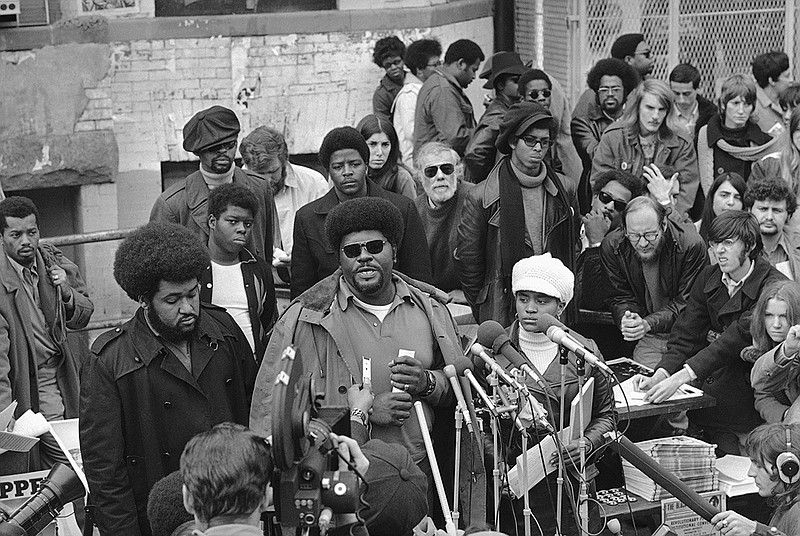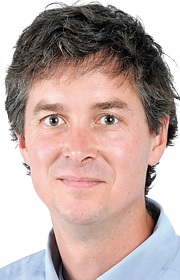Today's column is not about Karl Dean or Marsha Blackburn or Bill Lee, all of whom won in Thursday's elections.
It is, though, about another man. Not a politician, but a Chattanoogan whose life was as crucial, if not more so, to our American democratic story.
Elbert Howard was born in the winter of 1938, already endangered: a black male in Jim Crow Chattanooga. His family raised him with love, but could not love him away from the violence.
"Although he was surrounded by a loving family and community, Elbert was very aware that he lived in a racist, unjust, segregated society," stated a blog, "Bigmanbpp", devoted to Howard. "He witnessed daily atrocities, including the whipping of one of his relatives by the Ku Klux Klan."
Graduating from Howard High School in 1956, he joined the Air Force then moved outside Oakland, California, where Howard, rightly nicknamed "Big Man," with his linebacker's build, met two Merritt College classmates.
Bobby Seale.
Huey P. Newton.
Their friendship would change America and the world.
It was 1966. Malcolm X had been assassinated; MLK, in two years. Howard had been harassed multiple times by the villainous L.A. police.
(Between 1962 and 1964, the Los Angeles police killed 65 people, including 27 who were shot in the back, according to Brandon Harris in the New Yorker.)
Howard, Newton and Seale began to wonder: how can we resist police violence? How can we regain power that rightly belongs to black people in Oakland? How can we prove that our lives matter?
"In the beginning, the police would patrol our community, and almost every week somebody would get killed, and so a show of arms was a necessary move at the time," Howard later told the Washington Post.
They started following police, witnessing traffic stops of black drivers. Carried law books, tape recorders, guns.
They published the Ten-Point Program, demanding education, housing, freedom, partially modeled after the Declaration of Independence.
Tired of turning the other cheek, they adopted a militant posture: berets and aggressive, armed self-defense.
They created free breakfasts, medical clinics and education programs.
In the fall of 1966, Howard became one of the original founders of the Black Panther Party for Self-Defense.
"They're always seen as more armed and confrontational, but that's the sensational part of their history," Manisha Sinha, professor of Afro-American Studies at the University of Massachusetts-Amherst, told USA Today. "What's really forgotten is that they were a continuation of the civil rights struggle. They're part of the forgotten black freedom struggle in Northern cities."
Two weeks ago, Howard, 80, died in his California home after a long illness.
National obituaries heralded him as a history-maker known around the world.
Before the Panthers dissolved, partly due to FBI infiltration, Howard was the Panther's international spokesman.
He ran the Panther newspaper, which published some 200,000 copies per week.
He created classes for inmates, medical clinics, breakfast programs.
He was seen by many as a gentle giant.
"Big Man is the nicest person on Earth," Seale once told the Washington Post.
I'm embarrassed to say I never knew Howard was from Chattanooga until reading his obit. Shortly after, I learned that Willie "Mukasa" Ricks, one of the leaders of the Student Nonviolent Coordinating Committee, was born and raised here. So, too, Lawrence Curry, beaten for refusing to give up his Chattanooga bus seat, who later helped integrate our city's segregated post offices - he was fired and punished for doing so - who then tangled with Birmingham's notorious Bull Connor, then helped register some 16,000 Chattanoogans to vote, before becoming Chattanooga's first black constable in 1968.
Or Ralph McGill, the Soddy-Daisy man who became Atlanta's nationally known columnist who championed civil rights.
From this same soil we now walk came so many American heroes.
Yes, what happened in Thursday's voting booth matters.
But the truest expression of power is always in the hands of organized people on the ground, resisting violence, creating goodness, pride and community.
"People didn't understand what our survival programs really meant: schoolchildren's breakfasts, feeding the hungry. Those programs helped immediate problems. They were also organizing tools," Howard told PBS. "We got the community involved, teaching them how to become self-reliant, whereas the government wouldn't help with problems. It was about us helping ourselves."
David Cook writes a Sunday column and can be reached at dcook@timesfreepress.com or 423-757-6329.

